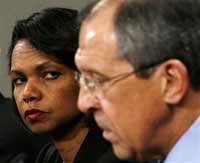USA acknowledges Russia's concerns over missile defense system
Russia's foreign minister has said new U.S. proposals would allow Moscow to closely monitor activities at U.S. missile defense sites in Europe, according to an interview released Wednesday.

Sergey Lavrov reaffirmed Moscow's strong opposition to the U.S. plan to deploy a battery of missile interceptors in Poland and a radar in the Czech Republic, but said Washington's new proposals reflected the U.S. acknowledgment of Russia's concerns.
"The American side is ready to offer us an entire series of trust-building measures so that we become convinced that their system isn't working against us," Lavrov said in an interview with the daily Izvestia, which was posted on its Web site. "Its meaning is as follows: we will be able to see what the radar is doing and what the real condition of the interceptors' base is _ involving both human factor and technical means."
Lavrov's statement comes a day after he and other Russian officials wrapped up talks in Moscow with U.S. Secretary of State Condoleezza Rice and U.S. Defense Secretary Robert Gates.
The meeting brought no visible breakthrough on the contentious issue.
Gates had indicated that Russia would receive the proposals in writing late Tuesday. On Wednesday, Russian news agencies quoted Russia's Foreign Ministry spokesman Mikhail Kamynin as saying that Russia had received the proposals and was studying them.
Lavrov would not say whether the U.S. proposals would be enough to assuage Russian concerns. He repeated criticism of the U.S. missile defense plans, but also expressed satisfaction that the Kremlin's concerns were heard.
"The missile defense issue has been decided in Washington and our attitude to that is well-known: this step would further erode strategic stability in the world," he said. "At this stage we have managed to make Americans acknowledge that our concerns aren't unfounded."
"They are continuing to persuade us that they have no intention to use these bases in Poland and the Czech Republic against us, but they have to accept our argument as well: in such things it's the potential and not intentions which matters," he added.
The United States says the facilities would protect against a potential threat from Iran, but Russian officials have said they believe the actual intent is to weaken Russia's nuclear deterrent.
The dispute is one of several that have created serious tension between Russia and the United States.
The visit by Rice and Gates was aimed to improve ties ahead of leadership changes in both countries.
Lavrov and Russian Defense Minister Anatoly Serdyukov had both indicated they were eager to have the proposals in writing. Last year, Lavrov accused the U.S. of backtracking on missile defense, claiming that written proposals fell significantly short of what Rice and Gates laid out orally in an October meeting.
Gates said Tuesday that the U.S. side spelled out more clearly some details of the proposals it made in the fall.
On Monday, Gates gave as an example the U.S. suggestion that Russia be allowed to monitor the activities in Poland and the Czech Republic. He said the Russians initially thought this meant they would be limited to monitoring through their diplomatic presence in the Polish and Czech capitals. Gates said that was clarified to mean the Russians would be permitted a physical _ but likely not continuous _ presence at the missile defense sites, and that the Russians appeared to regard this more favorably.
Russian officials have indicated they want a permanent monitoring presence and a say in evaluating when a threat from Iran would become imminent enough to warrant activating the interceptors.
Subscribe to Pravda.Ru Telegram channel, Facebook, RSS!


